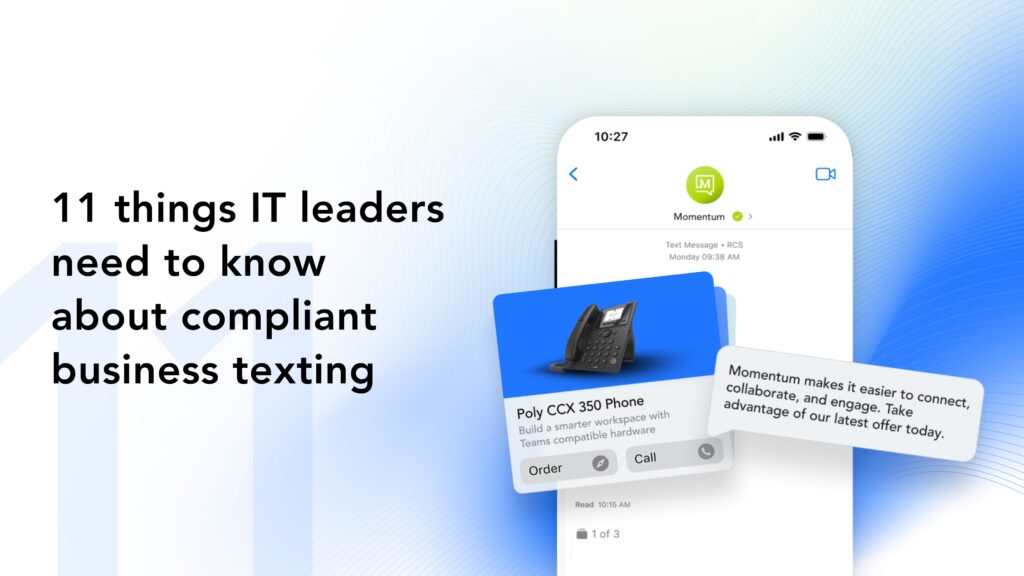Having a quality phone system is essential for running your business. However, what is right for your business when it comes to PBX vs. VoIP as an office phone system?
In general, both options provide all of the features you’ll want from a business phone system. However, there are significant differences in initial expenses, maintenance needs, and technical knowledge requirements.
In this post, we’ll provide you with a complete explanation of PBX vs. VoIP so that you can decide what system will work best for your company.
What’s the Difference Between PBX and VoIP Systems?
First, we need to take a look at the differences between PBX and VoIP, however, if these are new terms to you.

What Is PBX?
PBX phone system stands for “private branch exchange,” is a phone system that connects all internal phones, enables your business to make internal calls, and allows the transfer of calls easily.
A company can have more phones than phone lines if it uses PBX. This type of system utilizes extension lines instead of physical cables to send calls to the business number.
What Is VoIP?
VoIP, or voice-over-internet protocol. This is a technology that provides a way to talk to people over the internet. You might not be able to see them, but you can hear them, and they can hear you.
VoIP phones convert your voice data into audio files in real-time, and the system then compresses these files in real-time and turns the voice into data packets. These packets are then sent to your VoIP provider, where they’re converted and linked to the intended phone.
If done manually this would be a time-consuming procedure, but the information is transferred at the speed of light, and there is no difference in terms of speed between analog and VoIP conversations.
The Big Difference Between IP PBX and VoIP?
Legacy PBX systems, like the public, switched phone networks (PSTN), employed analog switchboards. Today, most PBXs use digital networking protocols (IP) for internal communications, and IP PBX is another name for these newer systems.
IP PBXs, on the other hand, convert digital signals on-site and utilize line connections directly linked to the PSTN.
Furthermore, VoIP is a method of making phone calls over the internet. The phone transmits digital call information to the VoIP provider through VoIP. Then, data centers convert the signals into analog and deliver them to the PSTN.
Does Your Business Need a PBX for VoIP System?
A PBX system is not required to take advantage of VoIP, and the only requirements for VoIP are an internet connection and a VoIP phone. Without on-site PBX hardware, your VoIP provider may provide you with most PBX features.
Other Key Differences You Need to Know About
Both systems have their own pros and cons. However, understanding these key differences can help you choose the best system for your business.
Call Quality
VoIP primarily operates through internet connectivity. With VoIP, you will always have consistent quality, but it depends on your internet connection. You can also expect to be able to utilize the system anywhere that has access to the internet.
If one of your lines is down with PBX, all of your phone lines are down. This means that there’s not really any kind of redundancy with PBX systems.

Maintenance Needs
Both VoIP and PBX systems require maintenance. However, VoIP tends to require less maintenance because updates are unnecessary as often as with PBXs. After all, VoIP uses internet connectivity instead of PSTN connections, which means that you won’t need to make software upgrades as often as you would with other phone systems.
Upfront Investment
Installing a PBX on-site is a time-consuming and costly process. Uninterruptible power supplies, high-end routers, VoIP gateways, software, and other necessary equipment can all add up. It is frequently thousands of dollars.
Furthermore, that doesn’t even factor in the cost of actual phones or headsets.
However, IP phones are the most critical piece of equipment to acquire when using VoIP. You may also use USB headsets with computers to reduce upfront expenditures even more.
Scalability
The telecommunications industry has evolved past the point where the PBX is no longer necessary. This type of system still requires a lot of upfront capital, and furthermore, it requires a lot of time to install and configure.
In comparison, VoIP can be scaled rapidly with VoIP. By ordering more VoIP phones, add users to your plan, you can easily and quickly scale your phone system. With PBX, it’s not as simple, and you have to add extra phone lines and install new hardware for new offices.
Furthermore, IP PBXs are also much more flexible in terms of scalability because they do not require physical wiring as PBXs do. Those companies who want to add extra lines or hardware won’t need an entirely new system.
Standards-Compliant Technology
With no concern for industry norms, many custom-designed PBX dashboards are created. It’s only designed to function with a specific type of network hardware and phones. Whereas VoIP has standards and codes that allow companies to use cutting-edge technology and hardware.
International Calls
Telephone companies charge excessive minute charges for international calls. If you have a landline PBX, you must pay regular phone company rates. However, VoIP calling costs tend to be considerably lower. Many provider rates begin at $0.01 per minute and go up to $1 per minute (with certain limitations).
Team Mobility
Teams can easily handle calls from your computer or cell phone using VoIP. Customer care and sales personnel can take calls outside the office, and they may work from home when unwell and take emergency calls on the road.
The phones in on-premise PBX systems connect to an internal data network. You can’t use any phone or gadget outside the workplace. As a result, VoIP is also a hiring asset because 92 percent of millennials value flexibility when looking for work.
Security
Many large companies have a multi-million dollar security budget. However, they have engineers keep an eye on our networks 24 hours a day, seven days a week, and we conduct regular penetration tests. External calls are directly routed to the public switch network via the on-site PBX. Furthermore, there’s no worry about hacking since the system isn’t connected to the internet.
Domestic Calls
The majority of VoIP providers treat all local calls the same, and they don’t distinguish between local and long-distance conversations. Companies with a landline PBX may be charged for long-distance or minute usage, depending on their plan. Domestic calling can become significantly more affordable when switching from a landline to a VoIP service.
Are you ready to take your phone system to the modern age? Call Momentum today.
Emergency Calling
VoIP and PBX numbers are not the same as regular phone numbers, and they do not have a clear, connected location. 911 calls are free with VoIP plans but will still require an internet connection.
Users may not know that they must go through an external line to dial 911 because PBXs are inside calling networks. Users may also unintentionally dial 911 when attempting to reach an overseas call.
The fact that neither choice is ideal for emergency calls only underscores the popularity of cell phones.
Standards-Compliant Technology
Custom-built PBX dashboards are frequently created without regard to industry standards. It may only work with a specific type of network hardware and phones. By maintaining VoIP compliance and using current and supported codes, you may use cutting-edge routers, phones, headphones, and other equipment.
Outages
Analog phone lines are not connected to the power grid. On the other hand, internal servers and gateways make PBX installations dependent on electricity. Because VoIP connects to the PSTN via the internet and modems require electricity to operate, both will be disabled if power is lost.
Advanced Voicemail Features
Both PBX and VoIP systems offer advanced features like voicemail to text and voicemail to email. While these features come standard with VoIP systems, you may need to invest in more equipment to make use of these features on a PBX network.
Multimedia Communications
By definition, an analog PBX can only handle voice conversations. You may use instant messages and conference calls with both IP PBX and VoIP. The distinction is that with VoIP, you may now do it across offices and state lines.
Service Provider Options
With the popularity of VoIP and hosted PBX, there are far fewer on-premise PBX businesses available. If you don’t have a local PBX provider, you’ll have to use unproven contractors or your staff for the installation.
Internet Usage
Traditional PBX trunks use PRI, which is a considerably older technology. It’s generally on a separate network from your LAN and needs maintenance time and expense.
On the other hand, computer-to-computer (VoIP) calls may be connected utilizing your present network infrastructure (Ethernet). VoIP communications require only a small amount of bandwidth.
Phone Options
A regular PBX can only handle proprietary phones because it requires a proprietary phone. Because alternative solutions have grown more popular, there are frequently compatibility difficulties.
On the other hand, VoIP systems have a lot more alternatives. IP phones or regular desk phones may be used with an adaptor. Agencies might even use their own mobile devices or software on their computer to access the system.
Upgrades
Replacing a PBX system should be easy; however, it can be tough because of the same reasons as scaling, customization, and upgrading. At the very least, you’ll need new hardware and a person who knows how to use a PBX. Depending on your objective, you may require a group of developers.
You may use server rooms and closets for additional projects if you convert from a PBX to VoIP, allowing your IT staff to focus on more productive parts of the company.
Customization Options
You may customize a SIP PBX installation, but it’s a time-consuming process that usually necessitates the purchase of new gear and technical help. With VoIP, you can frequently modify your plan to obtain the features you want without having to buy any additional hardware.
Cell Phone Compatibility
A traditional PBX cannot be used with a smartphone. There are few compatible apps, and many solutions expressly prohibit the use of mobile phones with IP PBX. With VoIP, the smartphone is simply another choice for your agents.
These company phone service apps are available for iPhone and Android devices. Using their business number allows your employees to answer the phone even if they are out of the office.
Other Accessories
Cutting-edge VoIP headsets can be a tremendous help for active sales and support agents who rely on CRM data. You can easily connect them with blu-tooth technology and other convenient devices.
Size of Team
Traditional PBX solutions tend to work better in large office buildings with hundreds of employees.

However, IP PBX installations are suitable for medium-sized businesses and enterprises. One caveat is that they need sufficient IT staff and a reasonable technology budget to deploy and maintain a PBX system.
However, VoIP systems are different. Your PBX service is suitable for all business sizes and can easily handle large numbers of employees.
IT Team Involvement
Whether you’re looking for a hosted PBX or an on-premises PBX, your IT staff will be occupied no matter what kind it is. Because you own and manage the system, keeping it up to date and monitoring it are your responsibilities.
Related: eBook: Making Microsoft Teams your phone system
If any of the features cease to function, your employees must troubleshoot and repair the problem. With VoIP, the provider handles all the complex tech.
With or without a tech team, Momentum is a great choice for streamlining business communications. Book a meeting today.



